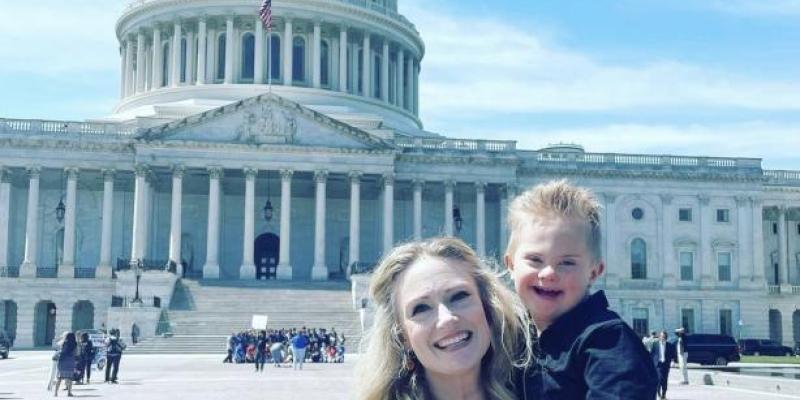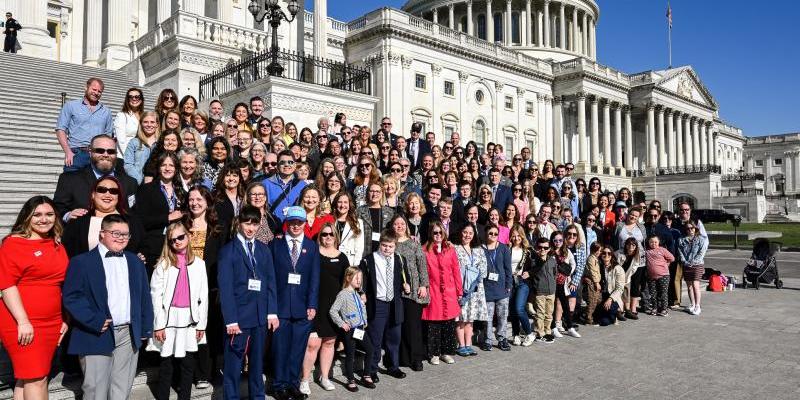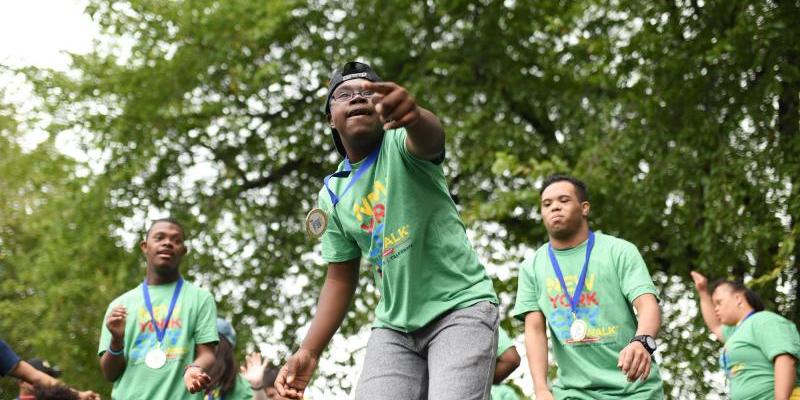[caption id="attachment_6885" align="aligncenter" width="594"] Gov. Inslee signs Substitute Senate Bill No. 5405, May 8, 2019. Relating to nondiscrimination in access to organ transplants. Primary Sponsor: Mike Padden[/caption]
How a bill becomes a law- Washington State Organ Transplant Discrimination Legislation
May 9, 2019
Passing legislation is a long game. In a democracy, rarely do things happen overnight, even for something as obvious as banning discrimination in organ transplantation because the recipient has a disability.
In August 2018, at the request of Congresswoman Cathy McMorris Rodgers (WA-05), former National Down Syndrome Society President & CEO, Sara Hart Weir, and I went to Spokane to talk about issues facing individuals with the disability. We hosted a roundtable discussion with employers who hire or want to hire individuals with Down syndrome and other disabilities and gave a presentation on ABLE Accounts so that self-advocates and their families could learn how to save money for their future without risking benefits.
As we were wrapping up, Washington State Senator Mike Padden of Washington’s 4th Legislative District approached Sara and me. He introduced himself asked a simple but profound question: How can I help?
At NDSS, we work on issues that affect the human rights of individuals with Down syndrome at the federal, state and local levels. Sara and I explained some of the issues the Down syndrome community faces particularly at the state level, given his position. We let him know that many people with Down syndrome and other disabilities, despite federal protections, are still denied access to the organ transplants they desperately need. We told him about James Wellman, a gentleman in California with Down syndrome who with 12% kidney function two years ago, was told by his doctor his IQ was too low for a transplant. Senator Padden was shocked.
We also let him know that eight states had passed legislation already addressing this issue. We let him know that California had already passed the legislation, so James was able to get his transplant after all. He asked us to send him the information on this type of legislation.
Later that month, we set up a phone call with the Washington State Senate Republican Caucus. We answered questions about what the legislation does, why it’s important, and gave anecdotes about people like James who have faced this type of discrimination across the country. We emphasized the importance of Washington State having this legislation before there’s a case similar to James’ so that there is a law on the books at the state level families can point to. The Washington State Senate Republican Caucus called a few times with more clarifying questions to make sure they were getting it right.
On January 21, 2019, the legislation was introduced by Senator Padden, had its first reading in the Washington State Senate, and was referred to the Health & Long Term Care Committee.
On February 4, 2019, a hearing was scheduled. I went to the hearing to testify, to tell why this legislation is so crucial not just for the Down syndrome community but the wider disability community. The process was simple. You check yourself into a computer system that lets the members of the Committee know that you are there to support/object a bill and whether you are there to testify. I marked that I was there to support Senate Bill 5405, the official number and that I was going to testify.
There were a number of bills that were being heard by the Committee that afternoon. There was a bill on insulin pricing and another related to breast cancer. There was a sea of men and women wearing pink to show their support for that particular piece of legislation.
Then, Senate Bill 5405 was called. The copies I had printed of my testimony were handed to each of the Senators on the Committee so they could have a copy to make notes, reference and remember why this legislation is important.
Before I began, one of the Senators made note that I came all the way from Washington, D.C. I let her know that is how important this legislation is. I gave my testimony and made note of the startling statistic surrounding discrimination in organ transplants. A 2008 survey of 88 transplant centers conducted by researchers at Stanford University found that 85% of pediatric transplant centers consider intellectual or developmental disability as a factor in their determinations of transplant eligibility at least some of the time. Additionally, 71% of heart programs surveyed “always” or “usually” considered ID/DD diagnoses when deciding eligibility for transplantation. I emphasized that individuals with Down syndrome and other disabilities have lives that matter. It went to the Senate Floor on March 8 for a vote. It passed with 48 yeas and 0 nays.
On March 11, the bill was introduced in the House and sent to the House Committee on Health Care & Wellness. The public hearing was held on March 20, one day before World Down Syndrome Day, one of the National Down Syndrome Society’s busiest days. Unfortunately, I could not attend in person but was able to watch online. There was an incredible self-advocate with Down syndrome who testified, Eric, who works for the Arc of King County in Seattle. His testimony was exceptional and heartfelt. We were so lucky to have him on our side and shortly after, the bill was passed through this committee, with an amendment requiring that an individual’s support system provide reasonable assurance that they will comply with post-transplant medical requirements. We were fine with this amendment and the bill moved onto the Rules Committee. The bill passed through and went to the House floor for a vote, which resulted in 96 yeas and 0 nays.
Because of the amendment to the original bill, the bill needed to go back to the Senate to be voted on again in its new form. The final vote in the Senate was 42 yeas and 0 nays. It was then signed by the President of the Senate and the Speaker of the House and was delivered to the Governor’s desk on April 25th.
I was notified on May 3rd that the bill signing would take place on May 8th. I booked my plane ticket and headed to Olympia for about 24 hours to be part of the festivities and meet the incredible advocates on the ground who helped make this happen, including Eric who testified. Eric and I were interviewed about the bill and then took photos at Sen. Padden’s desk on the floor of the Senate. We waited for hours under the dome of the Capitol, along with hundreds of other people, for our bill to be called by what could only be described as a town crier from medieval Europe.
“5405! 5405! Please make your way to the waiting room!”
We circled around the Governor’s chair and he read the summary of the bill “Concerning nondiscrimination in access to organ transplants.” He commented that this was a very important piece of legislation. After he finished signing, he gave Eric the pen he used and said hello to him. Eric is a stellar advocate, so the Governor recognized him. He then introduced himself as “Jay” to the rest of us and thanked us for our hard work. As we left, one of his staff grabbed a pen for me; identical to the one the Governor gave to Eric. I will cherish it forever.
After nearly ten months, the process was complete. Now individuals with Down syndrome and other disabilities cannot be discriminated against for organ transplants in Washington State. Washington is the ninth state to pass this legislation and we are also working with Louisiana and New York to pass similar legislation this year. We will continue repeating this process until this law is passed in all fifty states. We are so thankful for the help of all of those who made this possible.
Learn more about our efforts on behalf of those with disabilities with organ transplant issues here: https://dev-temp-ndss2.pantheonsite.io/advocate/ndss-legislative-agenda/healthcare-research/nondiscrimination-in-organ-transplantation-laws-toolkit/
To be more involved with our advocacy and policy team see link below: https://dev-temp-ndss2.pantheonsite.io/advocate/ndss-legislative-agenda/







